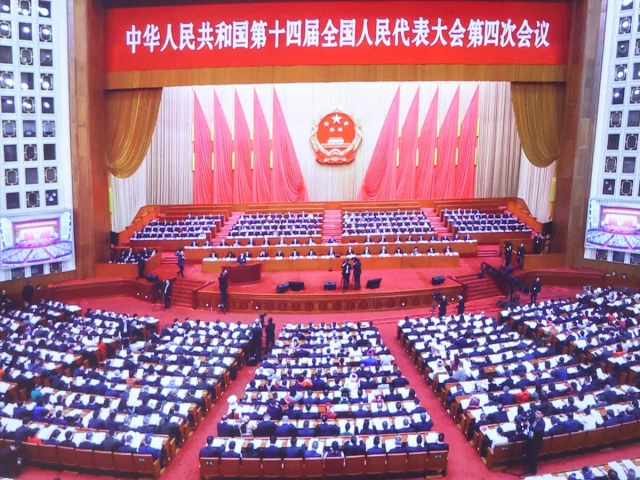WASHINGTON:
uThe Biden administration announced on Thursday that it was imposing sanctions on 16 allies of Venezuelan President Nicolás Maduro in response to allegations of voter fraud and the subsequent crackdown on the opposition following the country’s recent election.
This action comes days after Edmundo González, the opposition leader recognised by the US and other nations as the rightful winner of the 28th July presidential election, fled to Spain following a warrant issued by Maduro’s government for his arrest.
The US sanctions target key individuals, including Supreme Court President Caryslia Rodriguez, electoral council director Rosalba Gil, and National Assembly Vice President Pedro Infante.
The list also includes several military and intelligence officials accused of involvement in post-election repression. These sanctions are the first in a series of punitive measures taken by Washington in response to what it considers Maduro’s fraudulent claim of re-election. In addition to these sanctions, US Secretary of State Antony Blinken announced visa restrictions on an unspecified number of officials aligned with Maduro’s regime.
However, the Biden administration has refrained from taking further actions against Venezuela’s critical energy sector, which is already heavily sanctioned by the US. This decision raises questions about the potential impact of the new measures, as they do not target the oil industry, a significant aspect of Venezuela’s economy.
Analysts suggest this omission may be due to concerns about the effect on global oil prices and Venezuela’s already struggling economy. It is feared that harsher sanctions on the oil sector could lead to a further exodus of Venezuelan migrants towards the US-Mexico border, adding pressure to an already contentious immigration issue in the United States.
President Biden’s administration aims to penalise Maduro and his allies for allegedly reneging on a promise of a democratic vote while also seeking to push him towards negotiations with the opposition. Deputy Treasury Secretary Wally Adeyemo stated that the US.
Treasury was targeting key officials involved in Maduro’s illegitimate claims of victory and the violent repression of free speech following the election. He emphasised that the majority of Venezuelans are calling for change, a sentiment reflected in international condemnation of Maduro’s actions.
In response to the sanctions, Venezuelan Foreign Minister Yván Gil denounced them as a “new crime of aggression” by the US, describing the measures as unilateral, coercive, and illegal. Venezuelan election officials and the country’s Supreme Court have upheld Maduro’s re-election, while the opposition, citing their own tallies, insist that González won by a significant margin.
Many democratic countries have condemned Maduro’s victory as fraudulent and have demanded transparency, accusing him of manipulating the vote count.
Edmundo González, a 75-year-old diplomat, fled to Spain last weekend to seek political asylum after Venezuelan authorities accused him of conspiracy and other crimes, which he denies.
His departure has dampened Venezuelans’ hopes for political change, especially in the face of the post-election crackdown and the perceived lack of decisive international action to challenge Maduro’s hold on power.
Some US officials suggest that Washington’s cautious response reflects concerns over measures that could exacerbate Venezuela’s economic woes and trigger a greater wave of migration to the US.
These considerations are particularly significant as President Biden and Vice President Kamala Harris, who is running for president in the upcoming US election, aim to avoid giving Republicans more ammunition on the sensitive issue of immigration.
When asked about future potential sanctions on Venezuela’s oil sector, including possible restrictions on US oil giant Chevron’s operations in the country, a senior US official indicated that a range of options was being considered but provided no further details.
The current sanctions freeze any US assets held by the targeted officials, though there is some scepticism about their effectiveness. Washington has already sanctioned over 140 Venezuelan officials, including Maduro, and has imposed visa bans on nearly 2,000 individuals since 2017.
Despite doubts about the impact of these measures, US officials maintain that the sanctions are part of an ongoing effort to pressure Maduro into making more democratic choices before the presidential inauguration in January.
Washington, which dismissed Maduro’s 2018 re-election as fraudulent, had previously eased sanctions on Venezuela’s oil industry in response to a political deal between Maduro’s government and opposition parties. However, in April, the US reimposed those sanctions, accusing Maduro of failing to meet his electoral commitments.


1725345103-0/BeFunky_-(9)1725345103-0.jpg)


